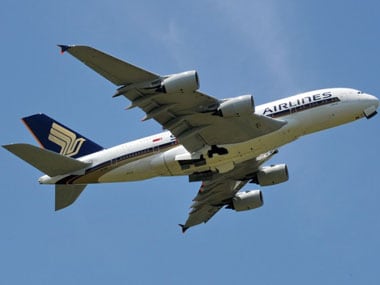New Delhi: It is obvious from the choice of aircraft of Tata-SIA that the new airline will initially fly only domestic routes. The airline has chosen to lease 20 Airbus 320 aircraft and apart from domestic flights, this aircraft can at best take wing to nearby international destinations.
The new airline floated by Tata Sons and Singapore International Airlines was widely seen benefiting immensely by imminent relaxation of a current rule which makes it mandatory for airlines to have a 20 aircraft fleet and five years of domestic operations before being allowed to fly abroad. Now that there is palpable hesitation on the part of the Ministry of Civil Aviation to scrap what is called the 5/20 rule, is this the reason for Tata-SIA’s choice of aircraft and “domestic only” business model for now?
[caption id=“attachment_1127509” align=“alignleft” width=“380”]  AFP[/caption]
A company spokesperson said that the 5/20 rule did not play any role in the choice of fleet and the airline was always meant to initially begin domestic operations only. Earlier, some Tata-SIA officials had indicated that the airline will open up international routes “the minute” the Government scraps the 5/20 rule. Civil Aviation Minister Ajit Singh has said multiple times in the past that the 5/20 rule will be lifted and his Ministry had even prepared a Cabinet Note on the issue. But now, there is a rethink on the proposal and 5/20 is unlikely to be scrapped in a hurry.
The Tata-SIA spokesperson said the airline would be full service domestic carrier to begin with.
Any full service airline business model in the current cost environment makes better economic sense when it also operates a full fledged international schedule since costs get rationalised, aircraft utilization is higher and jet fuel can be bought cheaper. Besides, Singapore Airline’s core advantages can be leveraged easily. And Singapore itself is a good place for hubbing so the joint venture airline can have an advantage over flights from India to US west coast and Australia via Singapore.
So the faster the new airline gets requisite permissions to fly abroad and acquires a wide body fleet, the quicker will be its financial turnaround.
Why the 5/20 rule is not being scrapped now has to be seen in the context of incumbent airlines and their opposition to this. Had it been scrapped, the immediate beneficiaries would have been the two startup airlines - AirAsia India and Tata-SIA - in each of which the Tatas hold equity stake. All domestic airlines are already eligible to fly abroad except GoAir where the fleet size was an issue but is now being resolved.
Impact Shorts
More ShortsSources close to developments indicated that the 5/20 issue is a political hot potato right now and the new Civil Aviation Secretary Ashok Lavasa has indicated that the political atmosphere right now is not conducive for any tweaking of this rule.
The 5/20 rule is unique to India and has historically been seen as needless restriction on Indian airlines. When startups such as Air Arabia and AirAsia were allowed to fly into India by their respective Governments, it obviously put our airlines at a disadvantage because of the five year domestic operation clause. These airlines were not restricted by any such conditions by their respective Governments. Meanwhile, the Tata-SIA spokesperson said the A320s will be taken on lease for 12 years in a staggered fashion and the airline will launch operations “well in time for the winter schedule of 2014”.
He also explained the choice of Delhi as Tata-SIA hub saying the single biggest problem new airlines face now is parking of fleet at night and only Delhi airport offers that option.


)

)
)
)
)
)
)
)
)



